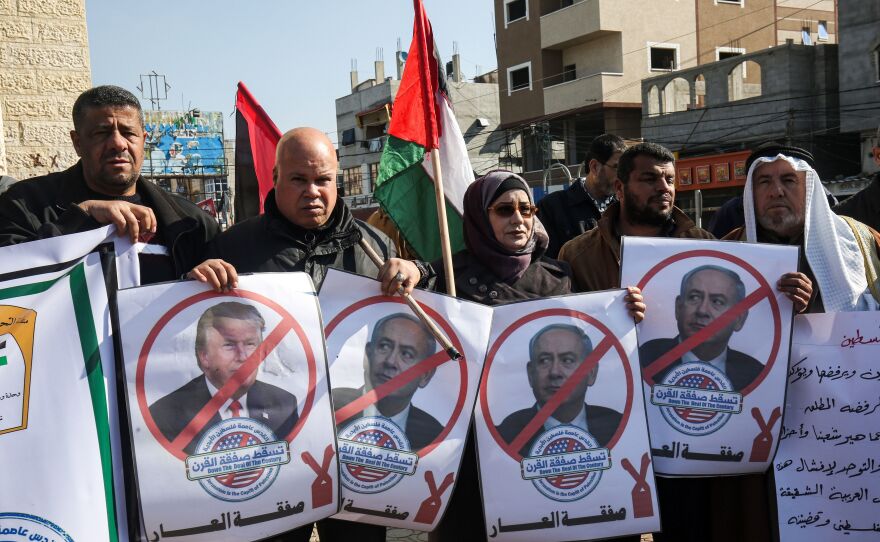Updated at 2:20 p.m. ET
President Trump says his long-awaited Mideast peace plan unveiled Tuesday is a road map for a "realistic two-state solution" that envisions Jerusalem as Israel's "undivided capital."
However, the plan limits the sovereignty of a future Palestinian state. Israel would be in charge of maintaining security over the state of Palestine, which would be "fully demilitarized." The plan also allows Israel to declare sovereignty over certain areas of the occupied West Bank, including Israeli settlements and the Jordan Valley.
Trump heralded the plan as a "historic breakthrough," even though the Palestinian leadership, which severed relations with the U.S. administration as it took a series of pro-Israel moves, rejected it before the proposal was formally released.
"After 70 years of little progress, this could be the last opportunity they ever have," Trump said at a joint briefing at the White House with Israeli Prime Minister Benjamin Netanyahu.
"My vision presents a win-win opportunity for both sides — a realistic two-state solution that resolves the risk of Palestinian statehood to Israel's security," Trump added.
The U.S. plan has been in the making since the earliest days of Trump's administration, when the president assigned his senior adviser and son-in-law Jared Kushner the task of trying to forge the elusive deal.
Trump lauded his own proposal as far more specific than other peace plans to date. He said it includes a detailed territorial map of the borders showing "territorial compromises [Israel] is willing to make," adding that it is the first time Israel has authorized the release of such information.
He also said the U.S. would open a new embassy in "Eastern Jerusalem" to the Palestinians, but it's unclear if that would be inside what are now considered the city's boundaries or in a neighboring area.
On Monday, Trump met separately with Netanyahu and Benny Gantz, the leader of Israel's Blue and White political alliance, Netanyahu's principal political opponent. Both Netanyahu and Gantz have expressed their approval of the plan.
Netanyahu has called the plan "a vision of peace which is historic" and thanked the president "for everything you've done for Israel," including recognizing Jerusalem as the capital.
Trump said Monday that the Palestinians "probably won't want [the plan] initially," but "I think in the end they're going to want it."
"It's very good for them. In fact, it's overly good to them," he said.
"So, we'll see what happens," he said. "Without them, we don't do a deal. And that's OK."
After Trump ordered the U.S. Embassy moved to Jerusalem from Tel Aviv in December 2017, the Palestinians largely broke off relations with the White House. The move, however, proved extremely popular with Israelis.
A spokesman for Palestinian Authority President Mahmoud Abbas on Monday urged Arab and Muslim ambassadors invited to Tuesday's "disastrous announcement" not to attend. The spokesman said the Palestinian Authority regarded the ceremonies as "a conspiracy aimed at undermining the rights of our Palestinian people and thwarting the establishment of the State of Palestine with East Jerusalem as its capital."
Palestinian Authority Prime Minister Mohammad Shtayyeh, speaking in the West Bank city of Ramallah, said Monday that the proposed deal "doesn't constitute a basis for resolving the conflict."
In June, the White House released the first half of its peace proposal: a $50 billion investment plan billed as a "new vision" for the Palestinian territories. The U.S. made the creation of the investment fund contingent upon Palestinian acceptance of the second, political part of the peace plan, released Tuesday.
The plan comes at a politically fraught moment for both Trump and Netanyahu. Trump is currently on trial in the Senate after he was impeached on charges of abuse of power and obstruction of Congress. Netanyahu was formally indicted Tuesday on criminal corruption charges.
Israel's prime minister "is trying to make this major diplomatic decision, even though his government is a temporary government, in part to shore up support for him domestically as someone who can champion Israel in the international arena," Natan Sachs of the Center for Middle East Policy at The Brookings Institution tells NPR.
Sachs also notes that when U.S. Presidents Bill Clinton and Richard Nixon were facing impeachment, they pushed forward with diplomatic efforts in the Middle East.
The plan includes proposals on several core issues that have been major obstacles to progress in previous attempts to forge a comprehensive peace. They include:
Israeli settlements in the West Bank
In April, Netanyahu pledged to annex West Bank settlements in a move aimed at galvanizing support among his right-wing voter base. He later extended that pledge to include annexation of the Jordan Valley, where Palestinians are seeking a separate state. Late last year, U.S. Secretary of State Mike Pompeo announced that the U.S. does not view settlements as a violation of international law, upending the decades-old U.S. policy that settlements are an obstacle to peace.
Trump did not clearly say how the plan handles the issue of settlements, though he said that "the United States will recognize Israeli sovereignty over the territory that my vision provides to be part of the state of Israel." He also said that no Israelis or Palestinians would be uprooted from their homes.
Palestinian statehood
Palestinians have long sought their own state, and much of the international community has supported that desire. In 2002, then-President George W. Bush called for a Palestinian state as part of his Road Map for Peace. In 2009, Netanyahu supported a "demilitarized" Palestinian state, but by 2015, he had reversed course, declaring his own policy "null and void."
Trump said he told Abbas in a letter "that the territory allocated for his new state will remain open and undeveloped for a period of four years," in which Palestinians may deliberate and study the deal and "achieve the criteria for statehood." He did not clearly spell out what the criteria for statehood is, though he mentioned the "firm rejection of terrorism" is one element.
Copyright 2020 NPR. To see more, visit https://www.npr.org.






